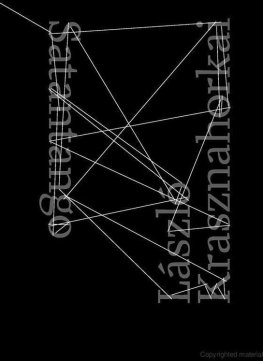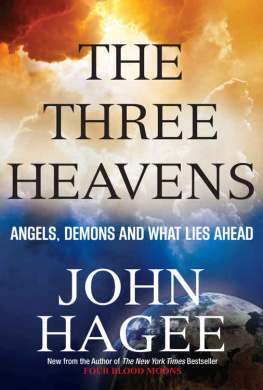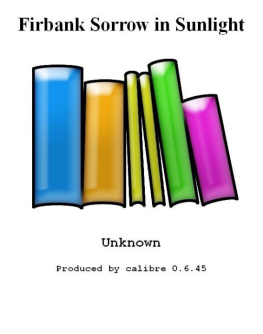Lszl Krasznahorkai
Destruction and Sorrow beneath the Heavens: Reportage
This book could have never come about without the unforgettable and irreplaceable assistance of Dr Surnyi Gyrgy and Dr. Joachim Sartorius; as well as that of Marguerite and Csar Menz, Dr Jrg Henle and Ginka Tscholakowa, Dr Barbara and Wolfgang Sietz, Dr Eva and Frederic Haldimann, Doris and Franklin Chow, Christine Hrlimann, Marika Heller, Frank Berberich, the Zuger Kulturstiftung, Dr Hanna Widrig and Dr Heinz A. Hertach; andYang Lian, Tang Xiaodu, Xie Zhimin, Zeng Laide, Ouyang Jianghe, Xi Chuan, Wang Xiaolin, Yang Qinghua, Tang Hu, Varga Mariann, Chen Xianfa, Xiao Hai, Lai Guoliang, Liu Huali, Fang Peihe, Ji Yinjian, Yao Luren, Jiang Yuqing, Rong Rong, Wu Xianwen, Gong Liefei and Abbot Pinghui.
The author particularly wishes to express his thanks for the truly invaluable suggestions and advice as well as the interpretation of extraordinarily difficult texts, of Professor Barnabs Csongor and Mria Ferenczy, as well as for their heroic translations of the Chinese texts Yu Zemin, v Kalman and Dorka Kopcsnyi, just as he thanks them gratefully for their editorial work; in addition, to Gergely Salt for the preparation of the notes; and, last but not least, Zoltn Hafner, the editor of the original Hungarian edition of this volume, whose support for the creation of this work went far beyond the usual editorial tasks.
Introduction into an Obscurity
There is nothing more hopeless in this world than the so-called Southwestern Regional Bus Station in Nanjing on 5 May 2002, shortly before seven oclock in the drizzling rain and the unappeasable icy wind, as, in the vast chaos of the buses departing from the bays of this station, a regional bus, starting from the No. 5 bus stop, slowly ploughs onward among the other buses and the puddles and the bewildered crowd of wretched, stinking, grimy people up to the vortex of the street, then sets off into the wretched, stinking, grimy streets; there is nothing more hopeless than these streets, than these interminable barracks on either side, numbed into their own provisional eternity, because there is no word for this hopeless colour, for this slowly murderous variation of brown and grey, as it spreads over the city this morning, there is no word for the assault of this hopeless din, if the bus pauses briefly at a larger intersection or a bus stop, and the female conductor with her worn features opens the door, leans out and, hoping for a new passenger, shouts out the destination like a hoarse falcon; because there is no word which in its essence could convey whether the direction in which he now travels with his companion, his interpreter, exists in relation to the world; they are headed outwards, moving away from it, the world is ever farther and farther away, ever more behind them; they are shaken, jolted in advance in the disconsolate brown and yellow of this ever-thicker, indescribable fog; headed to where it can hardly be believed that there could be anything beyond the brown and the grey of this frighteningly dreary mixture; they sit at the back of the ramshackle bus, they are dressed for May but for a different May, so they are chilled and they shiver and they try to look out of the window but they can hardly see through the grimy glass, so they just keep repeating to themselves: Fine, good, its all right, they can somehow put up with this situation, not to be eaten up from without and within by this grimy and hopeless fog is their only hope; and that where they are going exists, that where this bus is supposedly taking them one of the most sacred Buddhist mountains, Jiuhuashan[1] exists.
The woman at the ticket counter said that the trip would be roughly four hours, and then, just to be helpful, she added tilting her head a little by way of explanation that, well, what she meant was four or four and a half, from which it could already be suspected just what kind of bus they would be boarding; it has, however, just now, after the first hour, become obvious that no one really knows how long, because there is no way of knowing how much time it will take to get to Jiuhuashan, because the journey is slowed down by so many unforeseeable obstacles and chance occurrences and everything, particularly the weather, is completely unpredictable unforeseeable obstacles and chance occurrences which, as a matter of fact, are unforeseeable only to them as, for the most part, the personnel the driver and the conductor are to be thanked for all these unforeseeable obstacles and chance occurrences, the driver and the conductor, who as it becomes clear soon after leaving the city regard the task before them as their own private business venture, and so come to a halt not only at the prescribed stops but almost everywhere, trying to pick up more and more passengers from among the people walking along the side of the highway, from one kilometre to the next it is practically a hunt for yet more passengers, passengers with whom following a negotiation which is opaque to them, because hardly a word is spoken some kind of agreement is settled upon in a moment, money flashes in one hand, then disappears in another, on this ever-more congested route, therefore, black-market transport is taking place, that is, the front of the bus is packed, as is the middle, because hardly anyone is sitting at the back, to where they have been squeezed, no, they havent gone mad, it is much colder here, because the warmth of what is no doubt the sole operational heating device near the drivers seat doesnt reach this far, so that, in the battle for seats, only the weak and the less exceptional end up here what rotten bad luck, the two Europeans shivering in the artificial-leather seats keep repeating to themselves, that theyre in Nanjing and its May and yet its almost like February. As for speaking, there really isnt anyone to speak to, because their Chinese travelling companions, otherwise always inclined to acquaintance and conversation including the four people who have also ended up at the back do not breathe a word, neither to one another nor to them, everyone sits as far away as they can from everyone else, cocooned in their coats, scarves and hats, after they have arranged their packages near their feet and on the seat next to them, they just stare wordlessly through the grimy glass out into the brown-grey fog in which no one has any idea at all where they are, because, although it is already certain that they have disappeared into the endless terrain lying to the south-west of Nanjing, it is simply impossible to determine how far they have come and how far they have yet to go; Stein observes the passing of time on his watch, and he can feel that this is going to last for a very long time, for so long that it will no longer matter how long, really, if it will be four or four and a half hours, because none of this means anything in terms of time the bus makes a huge thud in the thick traffic on the pothole-blotched road, and the entire metal contraption shakes and rattles and throws them here and there in the ice-cold seats, but they doggedly move onward, in blind faith; and beside them on the side of the highway, piled high with their huge bundles, plastic bags, really, all those innumerable people: they are headed somewhere too, they are also going onward, walking in a row, leaning into the icy drizzling wind, into the rain, and only some of them motion yes to the shouting conductor leaning out of the bus, and they get on and its as if the rest of them dont even hear the shouting, they just simply pull back a little from the road until the bus rumbles off from alongside this ghostly procession, then they step back onto the asphalt and continue trudging beneath the weight of the bundles and the bags, clearly with that same blind faith, just like the travellers up there in the bus as the bus pulls away, splashing them with mud as if there were some common reason for this faith, as if in the absurdity of this balefully obscure scene, in which there really is nothing at all, it would be enough just to believe that, today, everyone will reach their goal.












